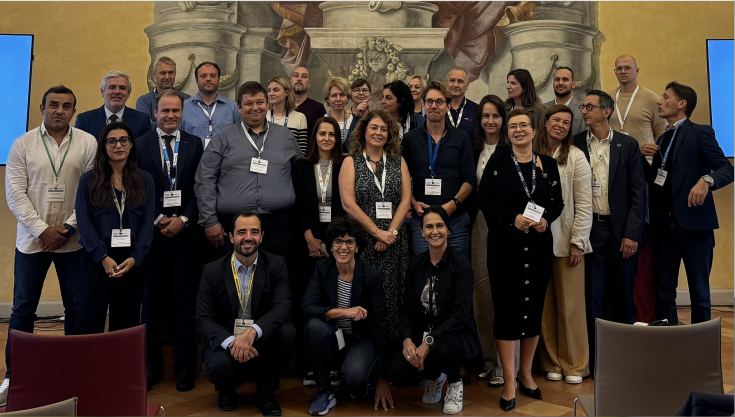Empowering policy makers to boost green H2 support capacity
Understanding the green hydrogen value chain –empowering policy makers for boosting support capacity
The EU's hydrogen strategy and REPowerEU plan have put forward a comprehensive framework to support the uptake of renewable and low-carbon hydrogen to help decarbonise the EU in a cost-effective way and reduce its dependence on imported fossil fuels.
The project Green Hydra, “Improving policies for engaging SMEs in the green hydrogen ecosystem”, within the Program Interreg Europe 2020-2027, gathers public authorities and other institutions from 10 countries to deal with better policies supporting the uptake of green hydrogen.
The partners gathered in Ravenna for their first international meeting on 18-19 September, hosted by the lead partner – Ravenna Municipality, in the impressive Palazzo Rasponi dalle Teste, a venue linking the city past with the ambitions of the future.
The capacity building workshop “Understanding the green hydrogen value chain –empowering policy makers for boosting support” was meant to increase the preparedness of partners and stakeholders to better understand the green hydrogen value chain elements and logic and how to ensure funding policies can support the integration of hydrogen into the industrial sector with the involvement of more local SMEs in participating countries.
After the official opening by the Municipality representative for economic development, port and European policies, Mr. David Zomer from Hanze University, the project associated partner, renowned for its innovative applied research in the field, has held the first session “Understanding the green hydrogen value chain”. The project “Green Waterstof Booster” has been then presented as a valuable and transferrable good practice by Dr. C.E. Tineke Van der Meij, Project advisor & Lecturer Hydrogen from ENTRANCE centre of expertise energy in Hanze University.
The workshop continued with an exercise on the topic “Empowering policy makers for boosting support”, moderated by Mrs. Tiziana Campisi, the Green Hydra Community Manager.
Next partners have been acquainted with the Green Hydrogen mapping process and the existing value chains in Emilia-Romagna Region by Ms. G. Claudia R. Romano – Manager of the Energy and Green Economy Area of Emilia Romagna Region.
The important issues concerning the social perception and the stakeholders’ engagement for the decarbonization have been presented with examples from the hosting region of Emilia-Romagna and the role of the Clust-ER Greentech in the topic-related HERCCULES project by Ms. Elisa Guasti - International Project Officer at Clust-ER Greentech.
The conclusions from the interactive workshops are meant to serve as a starting point for the collection and assessment of the good practices in the participating regions – the main focus of the project for the next months.
The learning process continued with 2 study visits.
In the Marina di Ravenna Energy and Sea Research Centre partners have learned about the opportunities of a dedicated decarbonisation and hydrogen lab by Professor Francesco Luca Basile - Director of the Interdepartmental Centre for Industrial Research in Renewable Resources, Environment, Sea and Energy - CIRI FRAME, University of Bologna. A presentation of the Agnes Energy Hub in the Port of Ravenna, serving as an operational hub, was made by Mr. Alberto Bernabini, Agnes AD. AGNES is an innovative company founded to develop renewable energy offshore in the Adriatic Sea, focusing on offshore and nearshore wind energy, offshore, floating solar energy storage systems hydrogen production from renewable sources. Mr. Francesco Magagnoli from Ravenna Port Authority illustrated the various green projects of the Ravenna Port..
After leaving the research centre the consortium visited the SAPIR company (by bus), the Ravenna’s biggest terminal, loading and unloading mainly clays, fertilisers and cars. SAPIR is involved in the decarbonisation of the Ravenna Port, and in AGNES project.
Partners have concluded that the workshops and the visits have significantly increased their knowledge on the green hydrogen implications. Next projects activities have been planned in the Steering committee meeting, held at the end of the visit.
